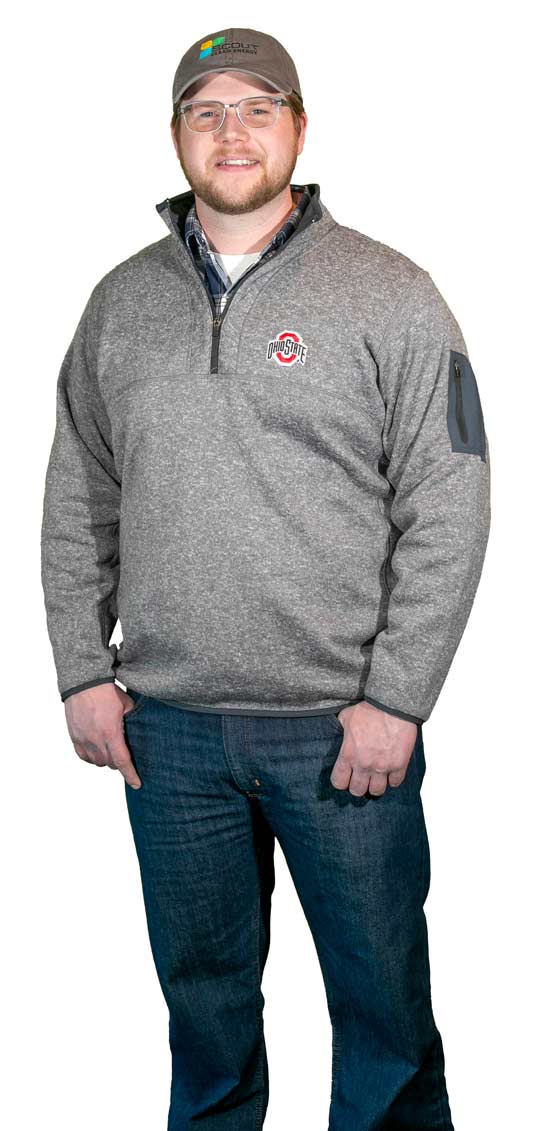family background/Anthony is an agricultural engineer who grew up in Washington’s Horse Heaven Hills then graduated from Ohio State University with a Bachelor of Science degree in agricultural engineering, specializing in machinery systems. He is the son of Rachelle and Jason Wiley.
age/25
hometown/Prosser, Washington
crops/grapes
business/Ste. Michelle Wine Estates

How did you get your start?
I grew up on the Horse Heaven Hills, and my introduction to agriculture was never really a formal introduction. It’s just all I’ve ever known. So, trying to figure out exactly how I wanted to fit ag into my career was not really an if, but where and how. From a young age, I always had a knack for taking things apart, putting them back together, figuring out how they worked. My parents always said I should become an engineer — before I even knew that that wasn’t just a train conductor. In high school, my advisors mentioned that ag engineering was an actual degree, and that’s what led me to look at Ohio State University.
What motivated you to study ag engineering and irrigation?
I grew up on a dryland farm on the Horse Heaven Hills, where it’s one of the driest places in the country. Water is gold; it’s a valuable resource. Me getting my feet into irrigation made sense. Since I was small, I’ve had an appreciation for that resource, and that’s carried me into learning about all the problems we’re seeing right now with water shortages, widespread drought and trying to manage our water effectively. My career choice and my desire to conserve the resource mesh quite well.
An ag engineering degree is really a generalist degree that you can specialize into different routes. It’s mainly dealing with anything you would see on a tractor or a combine or a sprayer: dealing with your mechanical, your fluid, your electrical systems, or the like. Some of the courses that really stood out to me throughout my time there were fluid dynamics and soil and water engineering. The introduction into fluids, how water flows and how it interacts with soil, types of piping and open channel flow, taught me the mathematics around what happens when water is flowing down a ditch or as water is flowing through a sandy soil or a clay soil.
What did you learn in college that you’d encourage others to learn?
Something that’s not inherently known in agriculture is what’s going on underneath the surface, as far as groundwater and surface water and what you’re actually doing when you stick a pump in a river or in the ground. Measuring the effects is something you need to understand. Some people don’t like chemistry, however, there’s some basic chemistry that’s very important to do, especially with drip systems. Because they’re smaller emitters, things are a little more sensitive than a big old sprinkler end gun or flood irrigation — the chemistry of your water that you are pumping out is important. Having a basic understanding of different chemical properties of the water and pH and how it actually interacts with your soil, with your crop, with your emitters is definitely a good idea.
What would you tell younger growers about your job?
I would say I got very lucky coming into a role like I did. I’m the only staff engineer at Ste. Michelle. It’s not like there’s a lot of jobs posted with an ag engineering title, and I grabbed that one up when I saw it. I’d say the best part about my job is that it’s very dynamic, and I have the ability to influence where our vineyards go from a technological standpoint into the future. We’re kind of at a pivotal point in our company and in the industry, when it comes to tech. Some systems have been in place for 10 to 20 years and are getting at the end of their lifespan in the field. I get to help make educated decisions on what we’re going to invest in next. And hopefully, that’ll carry us another 10 to 20 years. That’s the big challenge — and it’s been a good one.






Leave A Comment